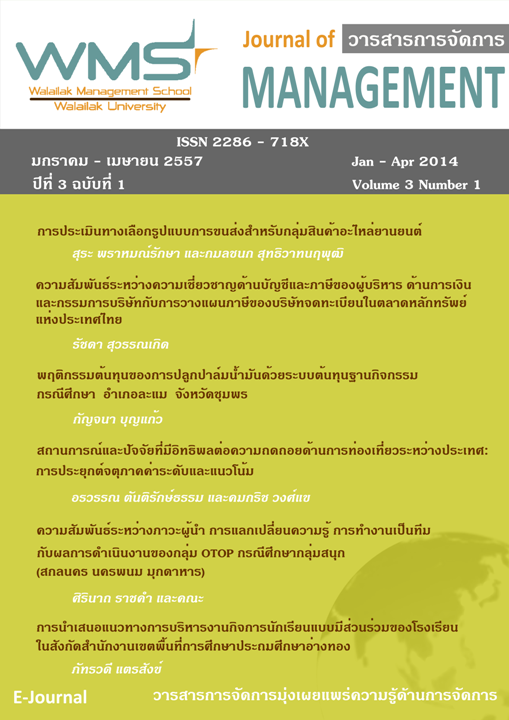The relationship between accounting and tax expertise of Chief Financial Officer, Executive Directors and tax planning of listed companies in the Stock Exchange of Thailand
Main Article Content
Abstract
This research aims to study the relationship between accounting and tax expertise of -Chief Financial Officer, Executive Directors and tax planning. The study were approached by the expertise of Chief Financial Officer based on (1) Education and Certified of Public Accountant (CPA) and Tax Auditor (2) years of experience as chief Financial officer, The expertise of executive directors in accounting and tax was considered from the ratio of skilled executive directors in accounting and tax per all executive directors. The expertise of executive directors based on (1) graduated in accountancy or finance (2) Certified of Public Accountant or tax (3) were a Chief Financial Officer. The best tax planning system, requires a person who was expertise in accounting and tax to leads the Company has an effective in financial management.
Data were collected from 237 companies listed by the Stock Exchange of Thailand in 2011. This research analyzed descriptive statistics with frequency, percentage, minimum and maximum value, means standard deviation and tested correlation with multiple regression analysis.
The results showed that the companies have average Effective Tax Rate of 23%. Chief Finance Officers from 225 companies (94.90%) out of total 237 companies did not graduate in accounting or finance, and were not the Certified of Public Accountant (CPA) or Tax Auditor. The chief finance officers from the rest 12 companies (5.10%) graduated in Accounting or Finance and were the Certified of Public Accountant (CPA) or Tax Auditor which is classified in service industry sector 5 companies. An average of duration of tenure in chief Financial officer is 7 years, average of ratio of skilled executive directors in account and tax per all executive directors is 23%.
The study found that, Effective Tax Rate of companies which employ the Chief Finance Officers graduated in accountancy or finance and were the Certified of Public Accountant (CPA) or Tax Auditor is 21% which is lower than an average of Effective Tax Rate of companies which employ the Chief Finance Officers who did not graduate in accountancy or finance or were not the Certified of Public Accountant. Companies which Executive Directors have experience of working in Chief Financial officer less than 7 years have average Effective Tax Rate of 23% and average of Companies which have Executive Directors occupied in Chief Financial officer more than 7 years is 24%. The average Effective Tax Rate of Companies which have 25% and above of the ratio of skilled executive directors in accounting finance or tax is 23% lower than average Effective Tax Rate of companies which have ratio of Executive Directors less than 25%.
At confident level 95% accounting and tax expertise of Chief Financial Officer and Executive Directors have no correlation with tax planning. However, Food and Agro Industry sector and Recourses sector have correlation with tax planning.Article Details
References
กัลยา วานิชย์บัญชา. 2550. การใช้ SPSS for Windows ในการวิเคราะห์ข้อมูล. พิมพ์ครั้งที่ 10. กรุงเทพมหานคร: ศูนย์หนังสือแห่งจุฬาลงกรณ์มหาวิทยาลัย.
ธัญพร ตันติยวรงค์. 2552. การศึกษาปัจจัยที่มีอิทธิพลต่อการวางแผนภาษีและความสัมพันธ์ระหว่างการวางแผนภาษีกับมูลค่าของกิจการ: หลักฐานเชิงประจักษ์จากประเทศไทย. วิทยานิพนธ์ปริญญาบัญชีดุษฎีบัณฑิต, จุฬาลงกรณ์มหาวิทยาลัย.
ปุณฑริกา โบกกระณีย์. 2549. ความสัมพันธ์ระหว่างความเชี่ยวชาญด้านบัญชีของผู้บริหารและกรรมการตรวจสอบกับการจัดการกำไรของบริษัทจดทะเบียนในตลาดหลักทรัพย์แห่งประเทศไทย. วิทยานิพนธ์ปริญญาบัญชีมหาบัณฑิตบัณฑิต, จุฬาลงกรณ์มหาวิทยาลัย.
ศิริชัย พงษ์วิชัย. 2553. การวิเคราะห์ข้อมูลทางสถิติด้วยคอมพิวเตอร์. พิมพ์ครั้งที่ 21. กรุงเทพมหานคร: ศูนย์หนังสือแห่งจุฬาลงกรณ์มหาวิทยาลัย.
ศิลปพร ศรีจั่นเพชร. 2551. ทฤษฎีบรรษัทภิบาล. วารสารบริหารธุรกิจ, 31(120), 1-4.
สมเดช โรจน์คุรีเสถียร และคณะ.2550. Tax Planning Stategies :Corporate In Come Tax กลยุทธ์การวางแผนภาษีเงินได้นิติบุคคล. พิมพ์ครั้งที่ 6. กรุงเทพมหานคร: บริษัท ธรรมนิติ เพรส จำกัด.
Check Derashid and Hao Zhang. 2003. Effective tax rates and the “industrial policy” hypothesis: evidence from Malaysia. Journal of International Accounting, Auditing & Taxation, 12, 45-62.
Grant Richardson and Roman Lanis. 2007. Determinants of the variability in corporate effective tax rates and tax reform: Evidence from Australia, Journal of Accounting and Public Policy, 26, 689-704.
Jagadison K. Aier, Joseph Comprix, Matthew T. Gunlock and Deanna Lee. 2005. The Financial Expertise of CFOs and Accounting Restatements. Accounting Horizons, 3(19), 123-135.
Kenneth A. Kim and Piman Limpaphayom. 1998. Taxes and Firm Size in Pacific-Basin Emerging Economies. Journal of International Accounting, Auditing & Taxation, 7(1), 47-68.
Xing Liu and Shujun Cao. 2007. Determinants of Corporate Effective Tax Rates: Evidence from Listed Companies in China. Chinese Economy, 6(40), 49-6.


